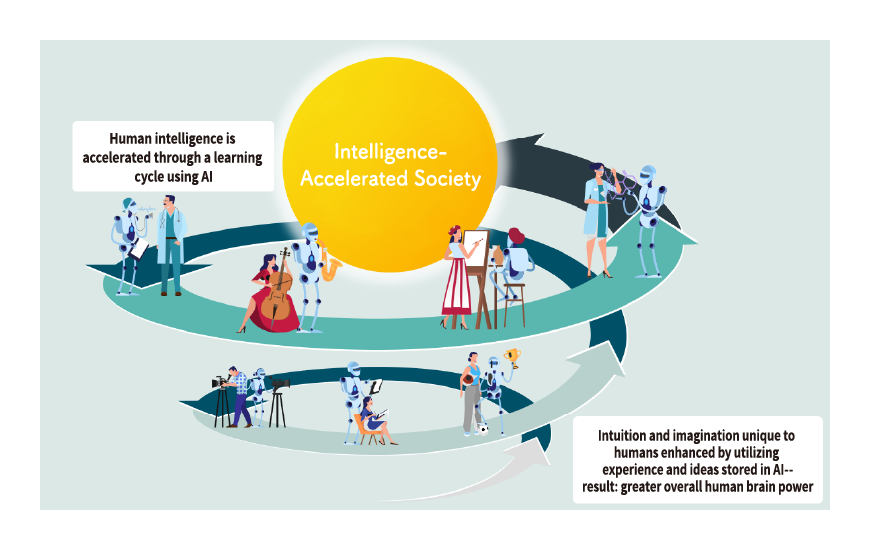
A world where AI provides humans with close support through super-human intellect
Potential for an Intelligence-Accelerated Society Through AGI
This article discusses two potential societies built on artificial general intelligence (AGI). The first is a society in which the technological singularity has been achieved and AI exceeds human intelligence—a singularity society. The second society features a different situation in which AI continues to accelerate the growth of human intelligence—an intelligence-accelerated society.
Potential for a Singularity Society
To begin, there are a host of theories concerning AGI, primarily in Europe and the United States, that are either skeptical of its achievement or forewarning of its effects.
For example, Murray Shanahan, a professor of cognitive robotics, asserts that it is difficult to develop human intelligence by imitating the nerve cells of the brain since neural networks also exist in other parts of the body (The Technological Singularity). On the other hand, Nick Bostrom, a professor at the Future of Humanity Institute (FHI), University of Oxford wrote in his book Superintelligence: Paths, Dangers, Strategies that in the near future, humans will face a risk of extinction due to the emergence of superintelligence far superior to the collective intelligence of humanity as a whole. American futurist Amy Webb also wrote in her book, The Big Nine, about the emergence of AGI, subsequent artificial super intelligence, and the future of IT giants in the United States and China.
Humans could fulfill a variety of roles in a singularity society despite AI always being superior to humans with regard to conceiving ideas and solving things. Humans might pursue pleasure in fields free from AI involvement. Such fields may include: art; activities that make use of physicality such as sports; and the natural environment, particularly living in harmony with nature. In the workplace, humans will likely work with AI colleagues to perform tasks that are currently unimaginable. Regardless of the specific situation, humans will probably be discussing what constitutes true happiness, like the ancient Greeks did, and pursuing happiness for themselves. People may also divide themselves into three groups by way of thought regarding AI: an anti-AI group, that refuses to use AI in their lives; an AI dependent group, that promotes more AI dependence; and an AI coexistence group, that maintains a neutral stance toward AI. The issue might become a political one with the three groups providing the basis for a new form of nationality.
Predicting if and when singularity societies will come to fruition is a difficult task. With many challenges facing the development of AGI, “unknown” might be the best answer at the moment. Nonetheless, current speculations place the start of the singularity society anywhere from 2045 to 2070. By that time, AI technology will have made tremendous progress compared to its current levels. Moreover, technologies beyond what can be imagined at present are likely to arise in the process of developing AGI.
There is much concern regarding the threat of AI taking over human work. However, it is possible that such progress in AI results in more than just a simple decrease of human value. Humans must become technical envoys capable of leveraging their imagination and creativity to use technology wisely in order to maintain their value as unique entities in the future. In an intelligence-accelerated society full of technical envoys, AI would not be a threatening presence, but rather a counterpart drawing out intelligence from humans and enhancing it. The following offers a positive outlook on such a society.
Potential for an Intelligence-Accelerated Society
Conceptual Image of Intelligence-Accelerated Society

Source: Mitsubishi Research Institute, Inc.
In an intelligence-accelerated society, humans will as technical envoys, acquiring new ways of thinking and perceiving the world thanks to feedback from AI including its judgment on the proper course of action and new ways of thought for reaching goals. In other words, AI will learn from the past experiential data of humans and the new experiences humans shared with machines, and humans will learn even further from the conclusions and processes derived by AI. Humans will also try to think of better ways of using AI and improve the skills of AI. Through this cycle, human capability will always remain ahead of AI, and growth of human intelligence will also be accelerated by AI.
Existing AI is based on pattern recognition, and results are merely probability values. This means that AI has no unique creativity. On the other hand, humans have intuition and creativity, in addition to pattern recognition. In terms of the number of experiences, humans cannot beat AI as AI can learn from a large amount of data, but skills that only humans possess, such as intuition and creativity, can further be enhanced by making full use of the experience values and thinking processes of AI. Should AI ever gain creative power in the future through evolution, humans will undoubtedly be able to leverage that creativity to expand their own brain power.
It is easy to imagine people from all walks of life using AI effectively: go and shogi players in thinking of new and effective moves; baseball pitchers in trying to outsmart batters; doctors in constantly researching diseases with extremely low probability of surfacing so that they can provide accurate diagnoses for patients of unknown causes; musicians in composing new musical phrases; artists in adopting new painting styles; and researchers in absorbing ideas from various different fields. New markets may also appear, with increasing demand for education on how to use AI. In such a society, new, diverse jobs and positions will appear, and the evolution of creativity may open up a world of unprecedented art and culture. MRI will continue to monitor the progress of and envisioning the possibility a positive future with AI.
